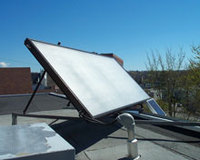
You’ve read enough psychoanalysis, and enough news coverage, and enough blah-blah-blah on Al Gore’s testimony yesterday to last you many, many weeks.
I just want to go back to one point Gore himself went back to, again-and-again, often in response to questions, usually unbidden.
The ElectricNet.
The concept is simple. The current electric power system is based on one-way traffic, on big plants sending power long distances and customers buying it. An ElectricNet is two-way. You can sell power back to the power company, at the market price, if you are producing more than you are using at any particular time.
The idea is that homes and businesses will soon be sporting solar panels and windmilling propellers, so that on temperate days, or when they’re out, they will be producing more power than they can use. If you can sell this power back, there’s an incentive for people to do more of this. Just as vital, you can cut the distance power must travel between producer and consumer — you lose less.
Getting from here to there is a massive undertaking. It requires that the whole electric grid be re-architected. This will cost a lot of money. If you mandate that the money be spent, and account for it in rates, then everyone’s rates go up. I believe that our electrical grid has to undergo fundamental change anyway — we need to install better conductors so they lose less of the power they produce — so some of these costs can be lumped into it.
But there’s another problem with what Gore is proposing. It’s really a
sort of client-server system, architected centrally. That’s not the way
the modern Internet works. In today’s Internet innovation occurs at the
edge. There’s very little central intelligence.
So here’s something we can do today.
Hydrogen collection.
All you need for this is an hydrolysis set-up some water (connect it
to the plumbing), a pump on the side producing hydrogen (the other side
produces oxygen remember, so that can vent into the air ) and a tank at the end of the pump for
collecting the gas.
Now, whenever your solar panels or windmills or co-generation unit or
whatever is producing more electricity than your home, store, office,
or factory is using, you shunt that electricity to the hydrogens
unit. You create hydrogen with it.
You put a sensor on the tank that
will call your vendor when it’s nearly full. They’ll swap out the tank,
pay you for your hydrogen (less the pick-up charge) and deliver it to
customers. Later, as the supply of hydrogen grows, you just connect
your set-up to a pipe. As the supply of hydrogen goes up,
and the cost goes down, you have fuel for cars, trucks, and other
vehicles using fuel cells, not to mention back-up power for all sorts
of purposes, maybe replacing the generators you now have for use in
case the power goes out.
The ElectricNet idea is a great one, don’t get me wrong. But maybe we
can do a lot more, and do it a lot faster, if instead we innovate at
the edge. Like on the Internet.












Actually, I’m not so sure about the whole electric grid having to be rearchitected to support ElectricNet. I have had some peripheral involvement in projects that had institutions reselling power back to the grid and the issue of the electric company having to do a retrofit never came up. Maybe the commercial grid is just different from the residential grid, but I doubt it. I think they are largely the shared infrastructure. Like most technology issues, the real obstacles to ElectricNet are political (and I lump lack of competition into the political worm can) not technical.
Actually, I’m not so sure about the whole electric grid having to be rearchitected to support ElectricNet. I have had some peripheral involvement in projects that had institutions reselling power back to the grid and the issue of the electric company having to do a retrofit never came up. Maybe the commercial grid is just different from the residential grid, but I doubt it. I think they are largely the shared infrastructure. Like most technology issues, the real obstacles to ElectricNet are political (and I lump lack of competition into the political worm can) not technical.
There’s a Wikipedia blurb on this topic.
There’s a Wikipedia blurb on this topic.